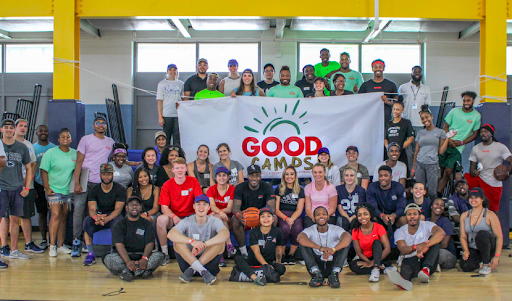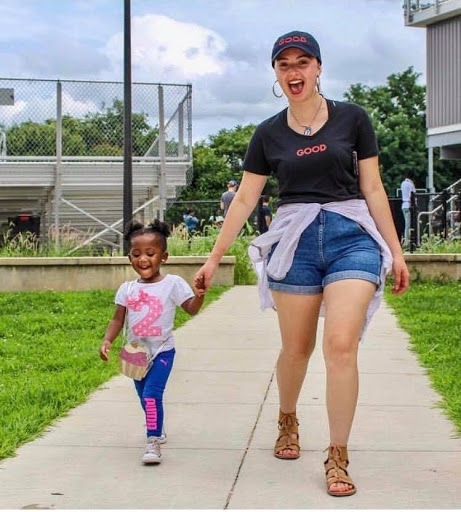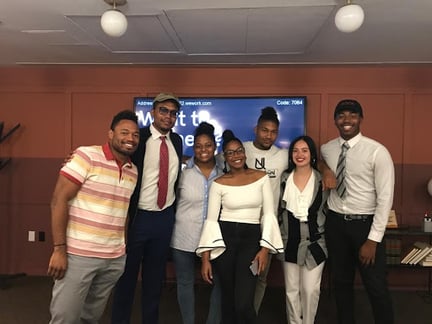What Does it Mean to be GOOD?
Imagine a life in and out of the system, with no mother since the age of nine, and a little sister who depended on your care. Now imagine growing up in Southeast D.C. where shooting sprees, poverty, crime, and drugs are the norm. This is Destiny’s reality…she is one of countless youth who struggle every day just to survive, and with aspirations that one day she’ll find a way out of this challenging cycle.

Meanwhile, just across the river lies promises of hope, fame, and fortune: The United States capital, the land of opportunities—the home of GOODProjects. This summer, I served as the lead intern with this start-up nonprofit in Washington D.C. During this time, I lived an entirely new reality and was exposed to different people like Destiny, as well as different cultures and lifestyles. I gained a whole new perspective.
What follows are a few takeaways from my experiences with GOODProjects and lessons learned about how to be good.
To Be GOOD Through Relationships
GOODProjects’ mission centers on being rooted in the communities they support: “GOODProjects is committed to giving out opportunities daily for youth and their families to live fulfilling lives free from poverty and violence with improvements to their health and wellness.” At GOODProjects, they believe it is important to work side by side with community members, and not for them. They believe it is important to be in the fight with those they are directly working with, rather than “serving” a specific population. They believe that if they provide opportunities, mentorship, and jobs to the Southeast D.C. community, they can alleviate individuals from the violence, poverty and disease that have shattered their community.
In order to successfully fulfill this mission, establishing and maintaining relationships within the community is key. My time with GOODProjects reinforced for me the importance of establishing genuine and trusting relationships with community members in order to create positive change and peace.

One way in which they do this is through the careful selection of those who join their team. At GOODProjects, a multitude of the staff are from the communities in which they now work, and they have been directly affected by the very issues GOODProjects strives to combat. They strategically hire employees who have some direct experience with poverty, gangs, or violence, and this experience helps to provide a level of comfort for the youth and families they work with because they can share relevant stories and insightful perspectives from their lives. Ultimately, this creates a foundation of relatability that provides a sense of openness among employees, volunteers, and those they seek to help.
Additionally, GOODProjects highlighted that once you have established a solid relationship with the community, individuals, groups, etc., you have to work towards creating a common ground, a level of understanding from a new perspective — one that does not only look from the outside in, but also from the inside out. To this end, GOODProjects not only assesses the most common and pressing problems hurting the community, but also explores how the people affected view these problems, the ways in which these problems are perpetuated, and the obstacles that are preventing those affected from moving forward.
As peacebuilders, we must directly involve the community members for whom we want to make an impact, ensuring there are enough platforms and people to listen to their wants, needs, and the injustices they have faced.
To Do GOOD Through Immersion
Living in Washington D.C., I saw that if you want to make impactful and positive changes, you have to be immersed in the entirety of the problem. Listening, learning and working to understand every crevice and corner — the whole picture must be seen. The more you know, the more you are able to assess, understand, and make an impact.
Immersing myself in the D.C. culture, and spending time with the youth and families of GOODProjects, allowed me to get a better sense of why things are the way they are there, why the people and places exist in the manner that they do, and why they continue to persist. It provided me with a chance to learn more about the struggles and milestones of Destiny, a youth with a tremendous amount of potential who continues to fight each day not to fall back into the behaviors that challenged her ability to survive. Destiny was another of the GOODProjects interns during my time there, and working closely with her enabled me to hear her stories of growth, her fight and perseverance, and how she was able to continue to not only transform her own life, but the lives of others.

Only after months of my full attention and constant learning did I truly feel like I had finally built enough connections and gained enough knowledge of the community, people and problems to create meaningful positive change. Specifically, in the final weeks of my internship, I was able to find more resources for the community members we supported, I was able to confidently speak to others about the issues I’d seen in the communities, and I was able to brainstorm relevant and influential ideas with other team members. All meaningful steps towards valuable support and solutions.
To Learn GOOD Through Lessons
The most significant lesson I learned through my experiences working with GOODProjects was the importance of malleability. In order to truly understand, provide support and guidance, and fight to make a change, you have to be willing and able to bend, adjust, and even break if necessary.
A prime example of this is when I first arrived in Washington D.C. I traveled across the country to a new place where I knew very few people and nothing about the city I was going to be living in for three months. Upon arriving, I learned that the housing situation I’d coordinated was no longer going to be available. Right from the start, the ability to adjust and flex became vital to my livelihood, and by extension to the success of my experience as an intern. If I had decided to give up once things did not go as planned, it would not only have made my internship journey increasingly difficult, I would also have lost out on the opportunity to work for a great organization, gain experience, learn new lessons and skills, and meet the many amazing people who I met along the way.
Interestingly, one aspect GOODProjects could improve upon is creating a specific space or opening environment for constructive criticism (i.e. learning to flex and adjust). The culture an organization creates sets the foundation for the work they do. Thus, as times are changing, so should the individuals who are trying to create positive change. As peacebuilders, it is essential to be malleable, and although it can be difficult, the experiences, challenges, and ideas from others can help us progress and keep from becoming static. There’s never a wrong time to learn more ways to be better, be open and be good.
Final Thoughts on Being GOOD
These three lessons have provided me with a better understanding of what I need to make a positive change in my own community, and are also important aspects to uphold while working towards the start of my own organization. Since leaving Washington D.C., I have been actively working towards assessing the needs of my own community, looking at what resources are lacking, and exploring how I can be a part of improvements that need to be made. Currently, I am creating a conflict resolution manual for youth organizations to utilize when conflict arises among staff, youth and members from the community.
GOODProjects provided me with the opportunity to work with a community of people who taught me more than I expected, who challenged me, and who ultimately led me to ask what it means to be good. Each day, it feels like I translate more of this learning into my everyday life and get closer to the work I want to get into.
I’d like to leave you with this — there is no right way to do good. It comes in all shapes, sizes, and colors. So whether you’re passing laws in the Senate or passing books out in the community, remember they’re all one and the same.
Demetria Flores is a Master of Arts in Peace and Justice (MAPJ) student at the Kroc School. Learn more about the academic programs offered by the Kroc School.
Contact:
Kevin Dobyns
kdobyns@sandiego.edu
(619) 260-7618

About the Author
The Joan B. Kroc School of Peace Studies (Kroc School) at the University of San Diego is the global hub for peacebuilding and social innovation. Founded in 2007, the Kroc School equips the next generation of innovative changemakers to shape more peaceful and just societies. We offer master's degrees in peace and justice, social innovation, humanitarian action, conflict management and resolution, and a dual degree in peace and law — programs that have attracted diverse and dynamic students from more than 50 countries. In addition to our graduate programs, the Kroc School is home to the Kroc Institute for Peace and Justice (Kroc IPJ). Founded in 2001, the Institute supports positive change beyond the classroom. Through groundbreaking research, experiential learning, and forward-thinking programs, the Kroc School and Kroc IPJ are shaping a future in which peaceful co-existence is the new normal.





